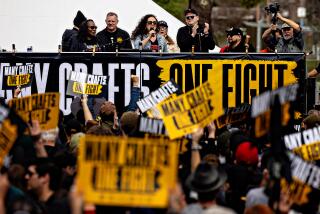NETWORKS, UNION PLAN MORE TALKS
- Share via
Union and network negotiators will resume contract talks in New York on Monday hoping to avert what could be the first strike in 19 years by news staffers and anchors at NBC, CBS and ABC. At issue is the technology used in broadcast journalism.
Unless the two sides resolve a disputed three-network proposal to eventually require on-air news staffers to handle cameras and other technical chores, “there is a real possibility of a strike,” says John C. Hall Jr., chief negotiator for the newscasters union.
Hall is executive secretary of the American Federation of Television and Radio Artists, whose 66,000 members include anchormen Tom Brokaw of NBC, Dan Rather of CBS, Peter Jennings of ABC and nearly 800 other on-air reporters at the networks and at network-owned stations.
Network officials decline to discuss the dispute, taking their lead from their chief negotiator, CBS industrial relations vice president James Sirmons. “He does not give interviews when negotiations are not completed,” a spokeswoman for him says.
The negotiations, under way since late last year, had been relatively low-key until August. Then, Brokaw, Jennings and 55 others--later joined by Rather--signed a public protest against what they said were network proposals to make them “technicians” as well as reporters. They said that gathering the news was a full-time job.
They weren’t against new broadcast technology, such as lightweight cameras and satellite transmission, they said, but did oppose new duties that “stand in the way of reporters seeing, thinking, writing and telling their stories.”
It is highly unlikely that Brokaw, Rather, Jennings and other top network correspondents would be called on to assume these new duties. But in a Sept. 4 follow-up letter to their colleagues, the anchormen nonetheless said they were alarmed at management’s proposals.
“Network negotiators,” they said, “have made it plain that in television they are talking about eliminating the jobs of (sound) recorder operator, cameraman, editor and producer--and having the reporter, if that is who ends up in the field, do all five jobs.
“We welcome technological change that improves our business and improves reporting; but a blanket sledgehammer approach to new technology for cost-cutting only would mean an end to radio and television as serious news media.”
The letter also was signed by the union’s Hall and 16 other network correspondents, including ABC’s David Brinkley and Sam Donaldson, CBS’ Robert Shakne (now part of the union’s negotiating team) and NBC’s Tom Pettit, who this year returned to reporting after a stint with management as an NBC News vice president.
“We just wanted to make it clear how we stood on this issue,” Brokaw said in a brief interview from New York this week. “We wanted to send a signal to our news and technical people on how strongly we feel about this.”
Despite the concern of the letter’s signers about management’s proposals, neither they nor their union rule out the possibility of some accommodation in which reporters could do some technical duties under certain as-yet undefined circumstances.
But that only can happen, they say, when and if jurisdiction over those duties in broadcast news is voluntarily surrendered by the two major technical unions in TV--the National Assn. of Broadcast Employees & Technicians, representing ABC and NBC technicians, editors and cameramen, and the International Brotherhood of Electrical Workers, representing those at CBS.
The letter writers say that “we cannot in good conscience bargain on these issues until and unless our colleagues and co-workers have freely agreed to yield jurisdiction over specific duties. We will not undercut fellow professionals.”
Neither NABET nor IBEW has yielded its exclusive jurisdiction over the work in electronic journalism performed by their members at the networks and network-owned-and-operated stations, Hall says.
However, he asserts, the networks will seek that when they hold their next contract talks with those unions, which in NBC’s case will be next March, and next September at CBS.
“Our basic position is this: ‘Deal with the technical unions first--we’ll talk only after your hands are clean, and then we’ll discuss and bargain as we would anything else,’ ” the AFTRA negotiator explains.
Hall, who calls the dispute over technical duties “the major stumbling block” in his union’s negotiations with the networks, says no date has been set for a walkout. “Neither side likes to give false deadlines,” he says.
If “there’s a glimmer of hope” by Friday next week, he adds, AFTRA may again extend its contract, which expired last November but has been extended during the union’s on-and-off negotiations with the networks.
If there’s no progress, he says, he’ll go to AFTRA’s national board “for the right to pull everybody out.” If there is a walkout, he adds, it probably wouldn’t start until November.
In addition to news operations at the networks and their stations in New York, Chicago, Los Angeles and Washington, a strike also would affect all network daytime entertainment programs and any variety and news programs in prime time, he says.
AFTRA’s last strike occurred in 1967 and lasted 13 days. All network correspondents and anchors refused to cross picket lines, with one notable exception--the late Chet Huntley, co-anchor of NBC’s “Huntley-Brinkley Report.”
Huntley, explaining why he continued working, contended that journalists didn’t belong in a union that also “represented actors, singers and dancers.”
More to Read
The biggest entertainment stories
Get our big stories about Hollywood, film, television, music, arts, culture and more right in your inbox as soon as they publish.
You may occasionally receive promotional content from the Los Angeles Times.










